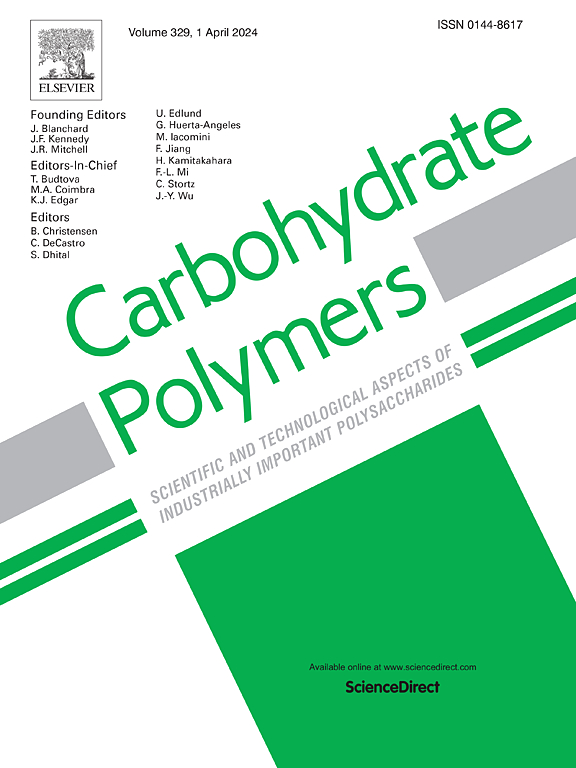裂肉多糖通过调节粪足菌/吲哚-3-乳酸/microRNA轴改善饮食诱导的肥胖
IF 12.5
1区 化学
Q1 CHEMISTRY, APPLIED
引用次数: 0
摘要
饮食引起的代谢紊乱是一个全球性的健康问题,生物活性多糖已被证明可以通过改变肠道微生物群来减轻代谢紊乱。裂叶菌多糖具有良好的抗肥胖作用,但具体的调控机制尚不清楚。本研究中,我们报道了SCP在体外可以有效抑制3 T3-L1前脂肪细胞的分化,添加SCP可以减轻hfd喂养小鼠的肥胖。SCP处理显著富集了鼠粪和ILA,并增加了几种脂质代谢相关基因AMPKα、PGC-1α和PPARγ的表达水平。SCP的抗肥胖作用可通过FMT传递。添加SCP和FMT可显著提高血清和粪便中ILA水平。此外,FMT显著提高miR-144-5p、miR-142a-5p和miR-150-5p的水平;这些mirna富集于磷脂酰肌醇信号通路,且与ILA含量呈正相关。脂质生成相关基因Nr2F6受上述mirna共同调控,其在FMT小鼠中的表达水平显著升高。这些结果表明,SCP通过增加F. rodentium和ILA的丰度以及某些mirna的表达水平来改善饮食诱导的肥胖。本研究为了解天然多糖的抗肥胖作用提供了新的参考。本文章由计算机程序翻译,如有差异,请以英文原文为准。
Schizophyllum commune polysaccharide ameliorates diet-induced obesity by regulating the Faecalibaculum rodentium/indole-3-lactic acid/microRNA axis
Diet-induced metabolic disorder is a global health concern, and bioactive polysaccharides have been shown to mitigate metabolic disorder by modifying gut microbiota. Polysaccharides from Schizophyllum commune have shown excellent anti-obesity effects, but the specific regulatory mechanisms remain unclear. Herein, we reported that SCP could effectively inhibit 3 T3-L1 preadipocyte differentiation in vitro and supplementation with SCP alleviated obesity in HFD-fed mice. SCP treatment significantly enriched Faecalibaculum rodentium and ILA and increased the expression levels of several lipid metabolism-related genes including AMPKα, PGC-1α and PPARγ. The anti-obesogenic effects of SCP can be transferred by FMT. SCP supplementation and FMT significantly increased the ILA levels in serum and feces. Moreover, FMT significantly increased the levels of miR-144-5p, miR-142a-5p and miR-150-5p; these miRNAs were enriched in the phosphatidylinositol signaling pathway and were positively correlated with the content of ILA. The lipogenesis-related gene Nr2F6 was coregulated by the above miRNAs, and its expression level significantly increased in FMT mice. These results indicate that SCP ameliorates diet-induced obesity by increasing the abundance of F. rodentium and ILA as well as the expression levels of certain miRNAs. Our study may provide a new reference for understanding the anti-obesogenic effects of natural polysaccharides.
求助全文
通过发布文献求助,成功后即可免费获取论文全文。
去求助
来源期刊

Carbohydrate Polymers
化学-高分子科学
CiteScore
22.40
自引率
8.00%
发文量
1286
审稿时长
47 days
期刊介绍:
Carbohydrate Polymers stands as a prominent journal in the glycoscience field, dedicated to exploring and harnessing the potential of polysaccharides with applications spanning bioenergy, bioplastics, biomaterials, biorefining, chemistry, drug delivery, food, health, nanotechnology, packaging, paper, pharmaceuticals, medicine, oil recovery, textiles, tissue engineering, wood, and various aspects of glycoscience.
The journal emphasizes the central role of well-characterized carbohydrate polymers, highlighting their significance as the primary focus rather than a peripheral topic. Each paper must prominently feature at least one named carbohydrate polymer, evident in both citation and title, with a commitment to innovative research that advances scientific knowledge.
 求助内容:
求助内容: 应助结果提醒方式:
应助结果提醒方式:


